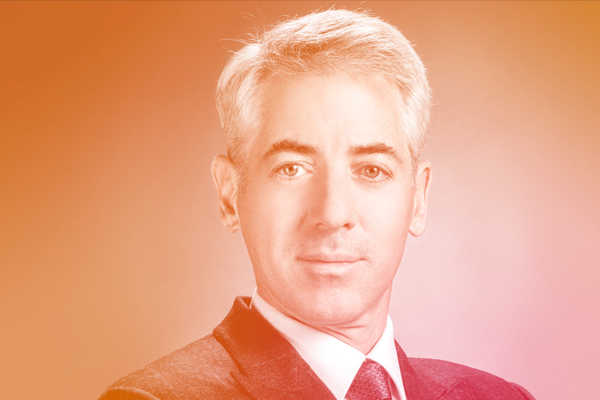
The founder of San Francisco-based Cota Capital, Babak Poushanchi, says the best days for enterprise-facing software businesses are yet to come, despite the spectacular returns they have delivered to investors over 2020.
The investor's Cota Growth Fund has already returned 66.7 per cent in 2020 and typically invests in listed US tech businesses valued about $US10 billion ($14.27 billion) or less.
Babak Poushanchi's top investment idea will be revealed at the Sohn Hearts and Minds Investment Leaders Conference on Friday.
In total, Cota Capital has about $US875 million under management across three funds investing in early-stage-venture or late-stage-growth private businesses, alongside businesses listed in the US.
Mr Poushanchi's top investment idea will be revealed at the Sohn Hearts and Minds Investment Leaders Conference on Friday.
Global investment industry heavyweights and thought leaders set to speak at the virtual conference headlined by Pershing's Bill Ackman include Ark Invest's Cathie Wood, and New York University professor of business Scott Galloway.
The Australian managers include Qiao Ma of Cooper Investors, Robert Luciano of VGI Partners, Will Curtayne of Milford Asset Management and Jun Bei Liu of Tribeca Investment Partners.
According to Mr Poushanchi, the US' leading enterprise software firms offer high recurring revenues, low customer attrition rates and high gross margins, which enable them to reinvest much of their sales back into marketing, research and development to produce strong organic growth.
"So you're getting the mission-critical stickiness of the utilities sector early in these very large and growing thematic areas where these companies have many years of outsized growth left," Mr Poushanchi says of the firm's approach to identifying investment opportunities.
"And for us in a generally lower growth, lower inflation, lower rate world, true areas of secular growth at scale are becoming harder to find and there is more of a scarcity premium put on these types of businesses with these kind of runways in front of them."
During COVID-19, consumer-facing tech or software businesses such as Zoom and Netflix increased their customer numbers at a rapid rate because of the sudden escalation in demand.
However, Mr Poushanchi says demand for the services of enterprise tech firms should grow, irrespective of lockdowns.
"The reason we're very drawn to this big thematic is we feel this is a several-decade, several-trillion-dollar transformation we're in the very early stages of still.
"Generally speaking, within enterprises across a lot of industries – whether you're talking about financial services, or energy, or healthcare, or manufacturing businesses – the amount these companies are spending on their enterprise technologies is going to roughly double over the next decade," he says.
"This has created an incredible opportunity for all these technology and software providers to enable these organisations to sort of move to the next version of themselves and we find that to be very exciting."
He believes a large percentage of the growing expenditure by C-suite executives across every industry will shift from legacy technologies to modern cloud-based technologies delivered and utilised over the internet.
"You're going to have this tremendous tailwind driving executives at all of these firms to become more tech-centric, more software-centric, more data-centric.
"It has to do with the way they conduct their business with other business partners. It has to do with offering tech-enabled solutions to their customers. It has to do with offering tech-enabled ways of working for their employee base."
The founder says he sees Cota as a partner to all its venture capital part-owned businesses and attributes the firm's market-thumping performance since being founded in 2015 to a unique style, culture, operating framework and investment approach.
Cota employs a full-time research team surrounded by operating and venture capital partners, who bring long careers and deep domain expertise across the sectors it specialises in.
"So there are people with a technical computer science development background who are users of these technologies and folks who come from the finance side of things," Mr Poushanchi says of the full-time team.
"And we have hired out of the venture ecosystem and the later-stage private equity and hedge fund universe, with tech specialisation.
"So it's sort of a marriage of an investment framework and innovation cycle to have the right technical expertise."
This article was originally posted on The Australian Financial Review here.
Licensed by Copyright Agency. You must not copy this work without permission.


In yet another fantastic episode with Equity Mates, first-time conference manager Qiao Ma chats with the guys about her incredible first investment, the investment philosophy of core manager Cooper Investors and the investment thesis behind her conference pitch, Shenzhou International.


NYU Stern School of Business Professor, serial entrepreneur and business podcaster Scott Galloway has blasted “sociopathic” big tech and the US government, while outlining the profound implications of COVID-19 for the US economy and its big players.


Australian investors will be very familiar with potential gains that can be created from innovations in the payment system, think Afterpay. In China, the mobile payments market is both enormous and advanced in technical terms, that’s where Yeahka Ltd operates — a top stock choice from Beeneet Kothari of New York-based Tekne Capital Management at the SOHN Hearts & Minds Investment Conference 2020.


Leading US fund manager Bill Ackman has predicted that 2021 will be a “very good” year for the US sharemarket, with a combination of low interest rates, fiscal stimulus and a new president who will not introduce radical policies.


The rise of telehealth and online medicine as a result of the COVID-19 pandemic has been behind the recommendation of New York based fund manager Cathie Wood, for US based telemedicine and virtual health care company Teladoc Health as her stock pick for the 2020 Australian Sohn Hearts & Minds Investment Conference.


When Bill Ackman realised coronavirus was about to run rife in the West he knew he had to do something fast to protect the $US10bn ($14bn) of assets managed by Pershing Square, much of it in restaurant brands that were vulnerable to the economic lockdowns he saw coming. Rather than sell stock, he opted to hedge via credit default swaps.


Halpert's “digital decolonisation” thesis is that entrepreneurs, companies, governments and consumers in developing markets are reclaiming their digital economies and ecosystems from multinationals, and developing indigenous solutions for local problems.


Billionaire investor Bill Ackman bemoaned his losing bet on Warren Buffett’s Berkshire Hathaway during a virtual appearance at the Sohn Hearts & Minds investment conference this week, according to the Australian Financial Review.


Bill Ackman predicts 2021 will be a rewarding year for the equity market and urged investors to "go long", but the Wall Street legend and Pershing Square founder worries that irrespective of Pfizer's vaccine breakthrough, the US faces a grim winter of coronavirus casualties.


Global stocks exposed to the technology boom, whose performance was partially fuelled by the coronavirus crisis, were the big winners from the calls made by top investment minds at the Sohn Hearts & Minds Investment Conference last year.


Leading US fund manager Bill Ackman has predicted that 2021 will be a “very good” year for the US sharemarket, with a combination of low interest rates, fiscal stimulus and a new president who will not introduce radical policies.


Online retail stocks have become the small cap investment story of 2020, according to Todd Guyot, a portfolio manager with Regal’s $320m Australian Small Companies Fund. “We have done well out of the whole online theme of late,” says Guyot, who will be tipping a stock at the fifth annual Sohn Hearts & Minds conference on Friday.


When Bill Ackman realised coronavirus was about to run rife in the West he knew he had to do something fast to protect the $US10bn ($14bn) of assets managed by Pershing Square, much of it in restaurant brands that were vulnerable to the economic lockdowns he saw coming. Rather than sell stock, he opted to hedge via credit default swaps.


Tekne Capital Management portfolio manager Beeneet Kothari says US technology stocks continue to look attractive given their strong earnings outlook and dominant positioning in what he sees as a multi-decade reshaping of economies and business fuelled by COVID-19.


The shock suspension of the Ant Group initial public offering, slated to be the biggest float in history, has left investors reeling, but it could be back up and running within weeks, according to Tribeca Investment Partners’ Jun Bei Liu.


US tech giants are on track: not just to soar through the pandemic, but to structurally lock in their competitive edge well beyond COVID-19. What is more, there will be a tsunami of reallocated capital across the economy, creating huge winners and losers that investors should get ahead of if they don’t want to miss out.


One of the fiercest critics of 'Big Tech', author and academic Scott Galloway, has admitted his bearish call on Afterpay was wrong and warned that America's internet giants are poised to consolidate power following the coronavirus pandemic.


Scott Galloway, outspoken academic and expert on big tech, says "Jedi mind tricks" and "consensual hallucination" are responsible for some huge market valuations, and warns Silicon Valley giants will entrench their dominance in the post-pandemic world.


It has gone down in Wall Street folklore as one of the greatest trades in history – a $US27 million ($37.8 million) bet during the market meltdown in March that returned $US2.6 billion in the space of three weeks. And the mastermind behind it, New York hedge fund titan Bill Ackman, is now bracing for another bout of turbulence.


Wall Street legend Bill Ackman says megacap stocks such as Starbucks will come out of COVID-19 with a bigger moat and a market dominance like never before, and no election outcome will make a difference to the plight of wrecked small businesses.


A little under a year ago, Cathie Wood named Tesla as her top stock pick for 2020. Speaking at the Sohn Hearts & Minds Investment Leaders Conference in Sydney last November, Ms Wood, who runs US technology-focused investment firm Ark Invest, said her bearish case was that the stock price would double by 2024. It hit that milestone less than three months later.


Rory Lucas may have one of the best jobs in finance. As the chief investment officer of Hearts & Minds Investments (HM1), it's his duty to oversee the $780 million portfolio of the best ideas from some of the world's top investors.


Legendary Wall Street investor Bill Ackman will headline the 2020 Sohn Hearts & Minds investment leaders conference this year in a major coup for the event that has raised more than $20 million dollars for medical research since its inception in 2016.